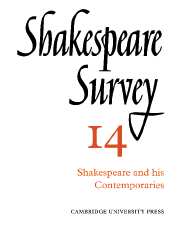Book contents
- Frontmatter
- Studies in Elizabethan and Jacobean Drama since 1900
- Shakespeare and Lyly
- Shakespeare and Mundy
- Marlowe as Provocative Agent in Shakespeare’s Early Plays
- The Tragedy of Revenge in Shakespeare and Webster
- The Simplicity of Thomas Heywood
- The Tragic Vision of Fulke Greville
- Shakespeare v. The Rest: The Old Controversy
- Shakespeare’s Gentleness
- Milton on Shakespeare
- An Unrecorded Elizabethan Performance of Titus Andronicus
- Stratford-upon-Avon a Hundred Years Ago
- International Notes
- Shakespeare Productions in the United Kingdom: 1959
- Three Directors: a Review of Recent Productions
- The Year's Contributions to Shakespearian Study 1 Critical Studies
- 2 Shakespeare’s Life, Times and Stage
- 3 Textual Studies
- Books Received
- Index
- Plate section
Studies in Elizabethan and Jacobean Drama since 1900
Published online by Cambridge University Press: 28 March 2007
- Frontmatter
- Studies in Elizabethan and Jacobean Drama since 1900
- Shakespeare and Lyly
- Shakespeare and Mundy
- Marlowe as Provocative Agent in Shakespeare’s Early Plays
- The Tragedy of Revenge in Shakespeare and Webster
- The Simplicity of Thomas Heywood
- The Tragic Vision of Fulke Greville
- Shakespeare v. The Rest: The Old Controversy
- Shakespeare’s Gentleness
- Milton on Shakespeare
- An Unrecorded Elizabethan Performance of Titus Andronicus
- Stratford-upon-Avon a Hundred Years Ago
- International Notes
- Shakespeare Productions in the United Kingdom: 1959
- Three Directors: a Review of Recent Productions
- The Year's Contributions to Shakespearian Study 1 Critical Studies
- 2 Shakespeare’s Life, Times and Stage
- 3 Textual Studies
- Books Received
- Index
- Plate section
Summary
Towards the end of his article, ‘Studies in the Elizabethan Stage since 1900’, in Shakespeare Survey, 1 (1948), Allardyce Nicoll considered future lines of research in this field and remarked, ‘the already existent inquiries into particular, as opposed to general, problems have been seen to have yielded matter of prime interest. We need more of these, conducted with the most rigorous selectivity.’ The same principle applies, I believe, to the material to be considered in this paper. A survey of the work produced on Elizabethan and Jacobean Drama (excluding Shakespeare for this purpose) over the last sixty years reveals fairly clearly a retreat from studies with the wide sweep of F. E. Schelling’s Elizabethan Drama 1558–1642 or W. Creizenach’s The English Drama in the Age of Shakespeare; their place has been taken, in general, by more detailed examinations of the work of individual authors, of individual plays, of distinctive dramatic forms, and by specialized studies of theatres, companies, and acting technique. Bibliographical and textual studies have placed a salutary check on fanciful interpretation and emendation, and have shown how dangerously little is still known about the essential basis of all our work—the author’s text and its transmission. The half-century has, in short, tended to be a period of stock-taking, old ideas being subjected to a more critical scrutiny in the light of, for example, more detailed knowledge arising from new documentary evidence, and new ideas tending to be based more firmly on evidence as opposed to conjecture and, as a result, tending to be more limited in scope. It is a stock-taking which no one will regret; it is by no means yet approaching its end.
- Type
- Chapter
- Information
- Shakespeare Survey , pp. 1 - 14Publisher: Cambridge University PressPrint publication year: 1961



